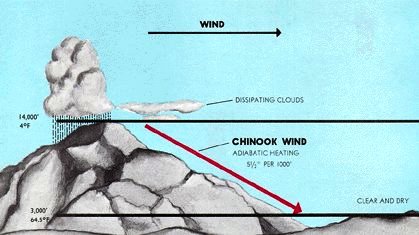Difference between revisions of "Translations:Adventist Youth Honors Answer Book/Nature/Weather - Advanced/9/en"
From Pathfinder Wiki
(Importing a new version from external source) |
(Importing a new version from external source) |
||
| Line 1: | Line 1: | ||
| − | ==4. Explain the following weather conditions:== | + | ==4. Explain the following weather conditions:== |
===a. Chinook winds=== | ===a. Chinook winds=== | ||
[[Image:Chinook wind.jpg|Adiabatic warming of downward moving air produces the warm Chinook wind]] | [[Image:Chinook wind.jpg|Adiabatic warming of downward moving air produces the warm Chinook wind]] | ||
Chinook winds, often just called chinooks, are winds in the interior West of North America, where the Canadian Prairies and Great Plains meet various mountain ranges. Southeast of the mountains, on the British Columbia Coast and in the Puget Sound area, it is a warm, very wet, southwesterly wind, likely to bring rain or snow. Northeast of the mountains, it is warm and dry, after being stripped of its moisture by the mountains in its path. | Chinook winds, often just called chinooks, are winds in the interior West of North America, where the Canadian Prairies and Great Plains meet various mountain ranges. Southeast of the mountains, on the British Columbia Coast and in the Puget Sound area, it is a warm, very wet, southwesterly wind, likely to bring rain or snow. Northeast of the mountains, it is warm and dry, after being stripped of its moisture by the mountains in its path. | ||
Latest revision as of 02:20, 8 January 2021
4. Explain the following weather conditions:
a. Chinook winds
 Chinook winds, often just called chinooks, are winds in the interior West of North America, where the Canadian Prairies and Great Plains meet various mountain ranges. Southeast of the mountains, on the British Columbia Coast and in the Puget Sound area, it is a warm, very wet, southwesterly wind, likely to bring rain or snow. Northeast of the mountains, it is warm and dry, after being stripped of its moisture by the mountains in its path.
Chinook winds, often just called chinooks, are winds in the interior West of North America, where the Canadian Prairies and Great Plains meet various mountain ranges. Southeast of the mountains, on the British Columbia Coast and in the Puget Sound area, it is a warm, very wet, southwesterly wind, likely to bring rain or snow. Northeast of the mountains, it is warm and dry, after being stripped of its moisture by the mountains in its path.
